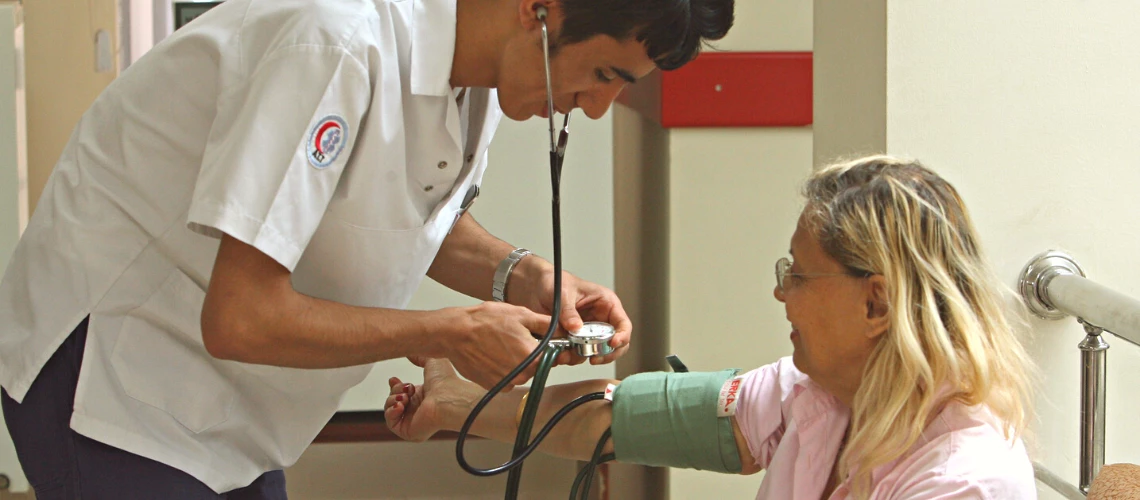 In response to overlapping crises, nearly all countries increased their overall government and health spending.
In response to overlapping crises, nearly all countries increased their overall government and health spending.
The shockwaves of the war in Ukraine hit many countries while they were still reeling from the COVID-19 pandemic. For many developing countries, the fiscal challenges have mounted ever since—the result of surging food, fertilizer and energy prices, rising interest rates, and slowing growth.
In response to the overlapping crises, nearly all countries increased their overall government and health spending. But only a few of them—mostly high-income countries—will be able to sustain these levels in the years ahead. Improving domestic resource mobilization, especially in a way that can sustainably broaden tax bases, will be crucial.
Taxing goods that are harmful to long-term growth and public health is one effective solution. Health taxes are excise taxes applied to products such as tobacco, alcohol, and sugar-sweetened beverages that cause health-related problems and generate harm to individuals as well as to society at large. Such taxes constitute one of the most cost-effective ways to reduce consumption of unhealthy products and save lives while raising much-needed government revenue.
Consumption of tobacco, alcohol, and sugar-sweetened beverages results in well over 11 million premature deaths each year (about 20 percent of all deaths in the world). In low- and middle-income countries, high and growing levels of consumption of such products have dire implications for human- capital outcomes and economic productivity. Raising excise taxes on tobacco, alcohol, and sugar-sweetened beverages can mobilize substantial additional revenue, helping governments summon the resources they need to increase development-related spending.
The success of health taxes depends, among other things, on how they are designed and implemented—and also on the ecosystem in which they evolve. Health taxes, after all, are a cog in the larger tax system of a country. For that reason, a sound macro-fiscal environment can play a large role in the degree to which they achieve their intended purpose. Health taxes should be designed for maximum effectiveness. For example, for most unhealthy products, specific (volume-based) taxes result in better health outcomes than ad valorem (value-based) taxes because they lead to higher prices and lower consumption. They also result in lower variance in prices, which improves economic efficiency. Specific taxes also are easier to collect, improving tax compliance.
"Specific taxes on alcohol content are common, but their use on sugar-sweetened beverages is more recent."
Specific taxes can also be structured differently. For instance, specific taxes on beverages can be based on volume or alcohol/sugar content. Determining what component of a product is subject to tax is a part of defining the “base” of the tax. This decision can have far-reaching consequences. When alcohol or sugar content is used as the basis for taxation, the patterns of production and consumption can change for the better: producers have greater incentives to reformulate their products and ramp up marketing on less harmful products. Or they can pass the cost of higher taxes to consumers, reducing consumption in the process.
Either way, consumption of alcohol or sugar is lowered—although not necessarily overall beverage consumption. Volumetric taxes, on the other hand, raise prices of all products and therefore lower overall consumption. Specific taxes on alcohol content are common, but their use on sugar-sweetened beverages is more recent. Exciting innovations are emerging—including the use of thresholds and tiers in South Africa and the United Kingdom. In both cases, the emerging evidence shows that using sugar content as the basis of taxation can be effective in spurring producers to reformulate and lower sugar content. In a time of high inflation, however, policymakers must be careful to ensure that inflation doesn’t erode the effectiveness of these taxes. It makes sense to review periodically excise taxes on unhealthy products to take into account consumer price inflation.
Using excise taxes to improve health outcomes is not new. The approach has often been deployed to curb tobacco consumption, for example. The World Bank and other partners have been making significant contributions in this field over the last decade. A World Bank team recently contributed to an important new book by the World Health Organization and Imperial College London titled Health Taxes: Policy and Practice. The book notes that health taxes will have an increasingly important role in tax systems—but how they are designed, implemented, administered, and monitored will make all the difference in how well they deliver health and revenue outcomes. A newly established workstream on Health Taxes under MTI’s Global Tax Program, in collaboration with the health, poverty and governance Global Practices, is building on these efforts to support health-tax reforms around the world.


Join the Conversation